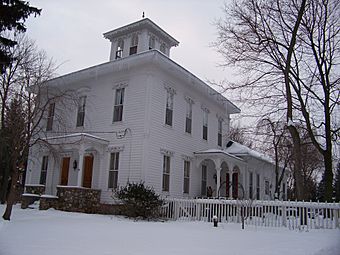August Westphal Farmstead facts for kids
Quick facts for kids |
|
|
August Westphal Farmstead
|
|
 |
|
| Location | 6430 Brighton Rd., Brighton, Michigan |
|---|---|
| Area | 4.2 acres (1.7 ha) |
| Built | 1868 |
| Built by | Christopher Blackburn |
| Architectural style | Italianate |
| NRHP reference No. | 85002151 |
| Added to NRHP | September 12, 1985 |
The August Westphal Farmstead is a historic farm located near Brighton, Michigan. It includes several old farm buildings that show how farms used to look. This special place was added to the National Register of Historic Places in 1985. This means it's an important historical site that should be protected.
Contents
History of the Westphal Farm
Who was August Westphal?
August Westphal was born in Germany in 1833. He moved to this area with his family in 1844. In 1853, when he was 20 years old, August bought the first 80 acres of this farm.
Building the Farmstead
In 1855, August married Barbara Emsbery. They had nine children together! They first lived in a small wooden house on the farm. As their family grew, they built more buildings. In 1868, they built a large barn. Then, in 1875, they built the beautiful farmhouse you see today. The farm became very successful. August Westphal eventually owned 205 acres of land.
New Owners and Changes
In 1916, the Westphal family retired. They sold the farm to Conrad Seim, who was also from Germany. The Seim family continued to farm the land until 1967. After that, the land was sold to a company that develops land. However, the original farmhouse and the buildings around it were saved. They are still standing on a four-acre piece of land.
What Does the Farmstead Look Like?
The August Westphal Farmstead has many old buildings. You can find the main farmhouse, two barns, and other smaller buildings. These include a corn crib, a wagon shed, a chicken coop, a smokehouse, and a privy (an old outdoor toilet). They are all grouped together.
The Farmhouse Design
The farmhouse is a two-story building. It is built in a style called Italianate. This style was popular in the mid-1800s. The house has two smaller additions on the sides. It sits on a strong foundation made of fieldstone. The outside walls are covered with wooden boards called clapboard.
Unique Features of the House
The front of the house has a porch. It has a very unusual entrance with two separate, arched doors side by side. One door opens into the parlor (a formal living room), and the other opens into the main living room. The roof of the house has a small tower on top called a belvedere. This tower lets in light and air. You can also see fancy wooden decorations on the porches, the belvedere, and around the windows.
Inside the Farmhouse
The inside of the house is quite fancy for a farmhouse. It has decorative plaster designs on the ceilings. There are also false fireplaces in the living room and dining room. These fireplaces have beautiful wooden mantels, even though they aren't real fireplaces.
 | Tommie Smith |
 | Simone Manuel |
 | Shani Davis |
 | Simone Biles |
 | Alice Coachman |

